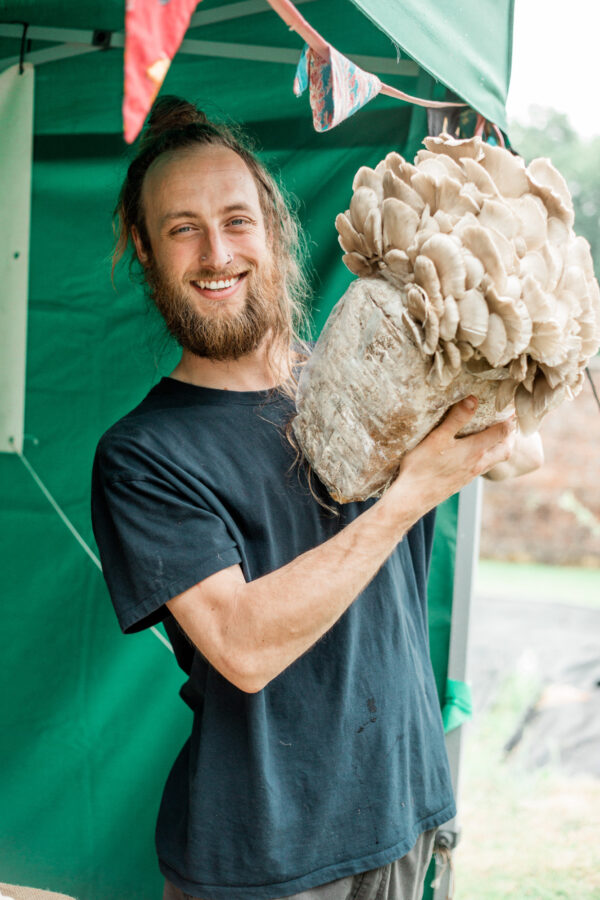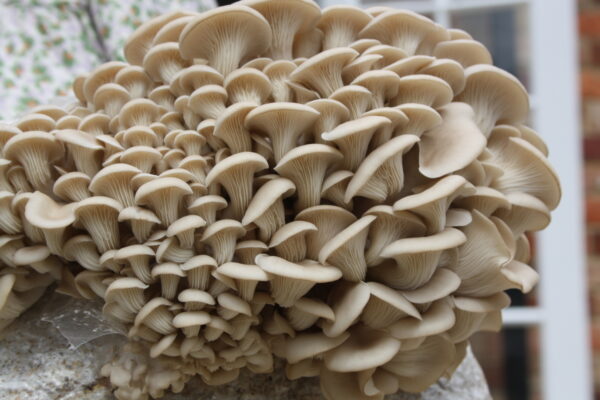Fancy Some Magic Mushrooms?
According to farmer Tom Beattie, mushrooms are wowing us with their culinary, therapeutic, and ecological benefits

By Tom Beattie
June 26 2024
Mushrooms have been integral to British cuisine and culture for centuries, but their popularity has ebbed and flowed through the years. In the Middle Ages, mushrooms were considered a delicacy and a symbol of wealth, as they were rare and expensive to cultivate. However, in the 16th and 17th centuries, mushrooms fell out of favour, as they were associated with witchcraft and poison. Many people feared that eating mushrooms could cause madness, disease or death and it wasn’t until the 18th and 19th centuries that mushrooms regained their reputation, mainly thanks to the influence of French cuisine and the efforts of botanists and naturalists who studied and classified fungi. Today, mushrooms are enjoying a resurgence in the UK, as more and more people discover their culinary, therapeutic and ecological benefits. Merlin Sheldrake’s Entangled Life gives us a tantalising glimpse into the symbiotic relationships fungi enable, forming vast subterranean networks of communication and co-operation, challenging our traditional notions of individuality and intelligence. Mushrooms are sustainable and environmentally friendly, as they require minimal resources to grow and can help decompose organic waste and improve soil quality. According to the British Mycological Society, there are over 15,000 species of fungi in the UK, but only about 300 are edible. Rich in protein, fibre, vitamins and minerals, mushrooms enhance the flavour and texture of any dish; dried and powdered, they impart that rare

culinary alchemy — umami. The button mushroom has long been the slimy grey backbone of stews and casseroles, but is being crowded out by its more complexly flavoured, firmer-textured cousins: chestnut, portobello, shiitake, oyster, enoki, chanterelle, morel and porcini. Lion’s mane, with the texture of meat and a delicate flavour not dissimilar to lobster, is an exotic newcomer to the UK, where it is beginning to feature on menus across the capital. But as well as its gastronomic credentials, lion’s mane is one of a host of rarer imports that boast various health benefits, such as boosting immunity, reducing inflammation, lowering cholesterol and blood pressure, and improving brain function. These increasingly popular ‘super’ mushrooms include reishi , the mushroom of immortality, which is said to help with stress, anxiety, insomnia and immunity; cordyceps, which is known as the “caterpillar fungus” and can help with energy, endurance, stamina and sexual health; and lion’s mane, best known for its impact on cognitive heath, helping with memory, focus, creativity and mood. Indeed, such is the mounting empirical evidence of their efficacy that mushrooms are being recommended as complementary therapies by even the most conventionally minded doctors. The active compounds in turkey tail and reishi are opening up new and promising approaches to cancer treatment.
Another controversial area of research is the potential use of psilocybin mushrooms. Used for centuries by various cultures and religions for healing and divination purposes, magic mushrooms are illegal in most countries as they are thought to induce paranoia, panic and psychosis. However, recent studies have shown that psilocybin mushrooms can have positive effects on mental health, such as treating depression, anxiety, addiction, and post-traumatic stress disorder. Psilocybin mushrooms are currently undergoing clinical trials and may soon become a legal and viable option for therapy and wellness. But where is this quiet revolution happening? Though the button mushroom, proverbially kept in the dark and fed on bullshit, still rules supreme from a commercial perspective, stranger, rarer, hipper fungi are to be found off the main drag. Keep your eyes open at the next artisan market or food fair you visit in provincial England and you are likely to find a mycologist, part of new wave of entrepreneurs with a spread of new exotics on sale.

I am part of this exciting movement, operating from a converted, Victorian twineworks in rural Somerset, where I produce oyster mushroom grow kits. From here, I also cultivate lion’s mane, cordyceps, reishi, and shiitake mushrooms. Using these, along with foraged turkey tail and chaga, I also produce mushroom extracts in small batches — about a week-or-so’s graft for a litre of the mucky brown gold. These solutions can be taken as part of a long-term wellness programme.
